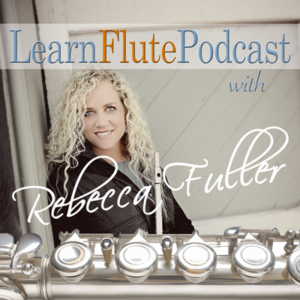Learn Flute Podcast SHOW NOTES:
In this episode, you will be learning all about how to hear the small details in music.
This is the Learn Flute Podcast Episode 076.
Yeah!
You’ll learn:
What this podcast will be all about
- Information on this podcast is supplemental to LearnFluteOnline.com
- How to relate details in a room to details in a painting
- How to train your ear to listen to details in music
- Some steps to help you get started.
- What you can look forward to learning from listening
Learn Flute Podcast 076
Press the Play Button to Listen Now:
Hello and welcome to the Learn Flute Podcast. I’m Rebecca Fuller the expert here at Learn Flute Online. This is episode number seventy six, and today we’re going to talk about learning to hear the small details in music. Interesting subject? I thought so. – let’s get started.
Welcome back- it’s great to have you here learning and striving to enhance your life through music. It’s a great thing, and I commend you for being here. Today we’re going to talk about something I love to notice, and to start out I’d like to give you a visual you probably can relate to.
Have you ever been somewhere like a restaurant and noticed the nice square or rectangle tables, the pictures on the walls, the designs on the rug, or even the flower vases? I’m betting you have. You probably do like most people and see the whole room kinda as a whole, and notice how nicely it is put together, and that the overall feel is warm and inviting.
I’d like to now draw your attention to the smaller details in the room like the actual colors of the flowers in the vases, the height of the tables, and what is actual painted in the artwork on the wall.. Got it? You’re seeing this in your mind, right?
Great.
Now let’s go even deeper. You can do it. Use your mind’s eye as a zoom lens and focus on the texture of each flower petal, and the smallest detail in the painting like the brush marks, or even the tablecloth texture. Did you do it? Awesome. You are now prepped and ready to talk to yourself about learning to hear the small details in music.
Music is described in many different ways. I like to realize that music is a ‘feeling’ either given or received – but usually both. It can’t be discovered without noticing the tiny details that make it up as a whole. I found a wiki definition you might find interesting since it points out different parts of music as in written words. It says that Music is an art form and cultural activity whose medium is sound organized in time.
The common elements of music are pitch (which governs melody and harmony), rhythm and its associated concepts tempo, meter, articulation, dynamics (that’s the loudness and softness), and the sonic qualities of timbre and texture (which are sometimes termed the as the “color” of a musical sound). Different styles or types of music might emphasize, or even de-emphasize or even omit some of these elements.
Music is performed with a vast range of instruments or vocal techniques ranging from singing to even rapping is considered music for some reason; there are solely instrumental pieces which we study a lot here at Learn Flute Online, and solely vocal pieces (such as songs without instrumental accompaniment) and also pieces that combine the singing and instruments.
We have music all around us. But, are we listening? I mean, are we really listening? Because we have so much sound around us I’m afraid that sometimes we become lazy as we filter out the noise. We can take time to use our mind’s ear (ya I said ear) this time to do just as I described earlier about zooming in on the small details of the restaurant with our eye, we will now use our ear.
Much like an art class with a teacher who points out the specifics of what is being seen, you can think of me as your master teacher who helps you fine-tune your ear into hearing even the smallest technicalities that will help you learn to put into the music what you are always hoping to get out of the music.
Now, we could work on this subject for years, but I think that this audio today will be a good introduction to the thought.
One of the most vital skills for a creative musician is called “active listening”.
Active listening is the ability to do the exact opposite of the “automatic filtering” we just discussed! Where our mind just kind of puts out all the details and listens to the whole. Instead of letting our brain tune out from the music and ignore it, you choose to actively and consciously pay attention to the parts of the music you hear.
Really focusing in on nothing but the music hitting your ears.
It takes time, and because it takes a little bit of time, most people just glaze over these kinds of details as they are basically just in a hurry to get to the end.
Even if you’re a huge music fan, it’s possible that you haven’t spent a lot of time developing your active listening skills. It’s all about using your brain to point to your ear and vice versa. This will really help develop your musical ear. Remember, it’s all in the details.
Here are a couple of exact skills you can train yourself to have, and you’ll be better off for it. .. and not just in a musical way. You’ll learn to see inside things like relationships, nature, moods, and other non-tangible aspects of life as well. Basically, I think that a well developed musician is training themselves to be a well developed human being as well.
Here’s the first tip I’d like to give you today, and that’s the next time you are listening to music, you can start working on this higher level of musicianship by identifying one particular part of the piece and separating it out with your mind’s ear..
Focus on one particular part of the music instead of hearing it as a whole. For example if you are listening to the radio and the song that is playing has a drum part- listen to just the drum.. For the whole song. Have you ever tried that? Focus in like a laser and just hear and feel the rhythm it plays for the entire piece. Can you do it? It might be harder than you think. You’ll probably get distracted along the way until you train yourself to have a longer attention span for this type of detail.
Okay, great. That’s a perfect start. The next thing you can do it take some time when you are by yourself and really able to relax and meditate with the music let it sink in- you’re going to listen for all of the things you do know first – like identifying each instrument and their name. Possibly the meter- meaning is it in four four time or three four time?
Then you will want to branch into something you don’t know or something that is completely not obvious to you like perhaps the form of the piece. Have you ever tried that? Is there a verse and then a chorus? Or is it two verses and then a chorus? You’ll need to take the same piece and listen to it over and over- each time separating and dissecting out something new.
If you do this, you’ll quickly become a higher level musician without even practicing your own instrument! I’m serious. Music is more than memorizing fingerings on the flute. That’s actually just the very beginning.
What a fun subject today, eh? I hope you’ll be able to take what I’ve said here and use it to enhance your musical life, which as I pointed out will help you in many other parts of your life as well. These online flute lessons are here for you, and will help you through pretty much every stage of playing the flute as well. Come take a lesson this week inside the member’s area. If you have any questions for me or want to know more, be sure to get ahold of me at Learn Flute Online dot com.
I’m here for you, and thrilled that you are too, on the adventure of learning how to play the flute. It’s fun, it’s rewarding, and I am leading and cheering you on!
We’ll see you next time!
Thank you for Tuning In!
Please consider subscribing and taking a minute to leave a review and rating for the podcast on iTunes.
I hope you’ve enjoyed learning all about flute and learning to hear the small details in music. Join us for the next episode.








